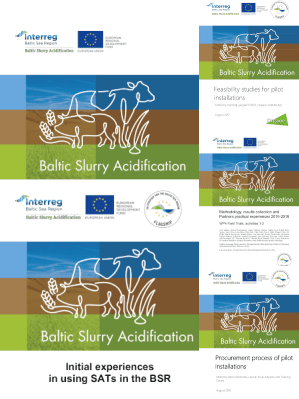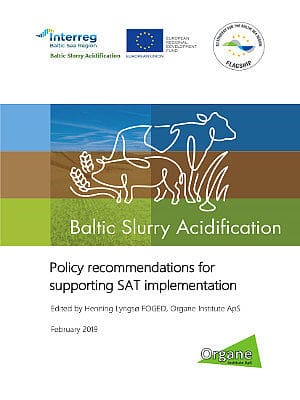Baltic Slurry Acidi.
Harmful emissions
Agriculture is accountable for about 10% of the global greenhouse gas emissions. In the Baltic Sea region, a large contributor to greenhouse gas emissions are ammonia emissions from animal manure slurry on farms. Ammonia emissions cause most of the airborne eutrophication of the Baltic Sea, almost all of which come from livestock manure slurry.
Not only do ammonia emissions threaten the waters of the Baltic Sea but also harm people’s health through the formation of secondary particulate matter, which is among the pollutants with the highest estimated impact on human health.
From waste to profit
In their work, farmers around the Baltic Sea region dispose tonnes of manure produced by their animals, which - if not dealt with properly - emit large amounts of ammonia. Additionally, farmers have to spend money to buy fertilisers for their crops.
In Denmark, farmers from 70 farms treat existing manure with acid, which reduces ammonia from evaporation from animal slurry into the atmosphere and reduce nitrogen loss. When the pH of the manure is lowered, emissions decrease and nitrogen is stabilised into a plant-available form. Moreover, the treated slurry can effectively be used as a fertiliser on the same farm without the need to purchase mineral nitrogen and sulphur fertilisers. The technology proved to be successful in Denmark; however, it is not widely spread, providing a chance for the project Baltic Slurry Acidification to make the Danish example common practice around the Baltic Sea.
Budgets
in numbers
-
5.08MillionTotal
-
3.99MillionErdf
-
0.00MillionEni + Russia
-
0.00MillionNorway
Achievements
Pilot investments in six farms
For over a decade, Danish farmers have successfully been treating animal manure with acid to reduce ammonia emissions but this practice was not widespread in the Baltic Sea region. Now for the first time, six commercial farms, experimental farms and agricultural contractors tested slurry acidification techniques (SATs) in Estonia, Germany, Latvia, Lithuania, Poland and Sweden. They tested the change in ammonia, the effect of using the treated slurry as fertiliser, and the running costs.
Farmers from each test site teamed up with at least one other organisation to get assistance in buying and setting up the slurry acidification tankers as well as in running the tests. For example, the Swedish RISE Research Institute, Latvian Rural Advisory and Training Centre and Danish Organe Institute supported SAT investments at the test sites of the Estonian Crop Research Institute, Polish Institute of Technology and Life Sciences and the Latvian private farm Lauku Agro.
Satisfying SATs
After 70 acidification processes and around 35,000 tonnes tons of slurry acidified, farmers from four out of six farms concluded to further use acidification techniques. Most of them did not notice any negative influence on the machinery nor the soil’s pH. The field trials proved that slurry acidification decreases ammonia emissions by 49–64%, and mineral nitrogen kept in slurry as a fertiliser allows for savings within the range of 0.77–2.10 € for each cubic meter of slurry.
The farmers shared this new knowledge with other farmers and agricultural advisors who visited test sites to learn more about the equipment and the field trials. The Swedish farm Br Göransson together with the Rural Economy and Agricultural Society exhibited the SAT equipment at the Swedish Borgeby Agricultural Expo and three conferences for milk and meat producers, reaching over 20,000 people in the industry.
Acidification techniques for businesses
Thanks to the support from the Polish Institute of Technology and Life Sciences in assessing the market potential, the Polish enterprises Pomot, Agroserwis and Lukomet became distributors of SATs in Poland. The Danish company Ørum Smeden has enough knowledge now on how to enter the Polish agricultural market with their products.
The Estonian Crop Research Institute helped Eesti Agritehnika become a distributor of SATs in Estonia, whereas another company Väätsa Agro AS learned from the project how to best apply slurry acidification into their current manure and fertiliser management.
The RISE Research Institute of Sweden worked closely with a Swedish consulting company Lifsung AB to integrate them into the existing Swedish manure handling systems and build their capacity for advising their clients on acidification techniques.
From local test case to regional good practice
The Interreg project Baltic Slurry Acidification used EUR 3.99 million from the European Union to turn a proven Danish solution into common practice in the region. Now, farmers around the Baltic Sea have more options at hand how to treat animal manure, reduce harmful ammonia emissions and fertilise their crops at the same time.
Spreading the project recommendations and results further is continued in the framework of the Interreg Baltic Sea Region project platform SuMaNu. The platform combines expertise from several projects to more efficiently manage manure and reduce the negative impact of farming on the Baltic Sea.
Outputs
Pilots SATs, procurement installation and commissioning in countries in the Baltic Sea Region

Policy recommendations for supporting SAT implementation

Project Stories
-
09.09.2020
Interview: “Interreg projects can push into the right direction”
To improve the water quality of the sea has been a continuous objective of Interreg Baltic Sea Region and its predecessor programmes. Many projects have received funding to reduce negative impacts of agriculture on the sea. The platform SuMaNu gathers and synthesises best practices and recommendations on nutrient management. We interviewed Henning Lyngsoe Foged from Aarhus, Denmark, who has been one of the driving forces to spread agri-environmental innovations across countries around the Baltic Sea.Read full story -
07.02.2020
Interview: How the SuMaNu platform creates synergies between projects
SuMaNu is about sustainable manure and nutrient management and is directly connected with the ongoing development of a Nutrient Recycling Strategy for the Baltic Sea. Interreg Baltic Sea Region’s project platforms are designed to capitalise on the results of existing projects financed from different EU funding Programmes and to create synergies between them, e.g. by feeding into policy making. We interviewed three experts from the SuMaNu platform, which started in autumn 2018, to find out.Read full story -
03.06.2019
A chemical trick to make the Baltic Sea waters clearer
There is something that house cleaning products, brie cheese and a pile of animal manure have in common. That is an pungent and unpleasant smell. A reason behind the bad odour is the chemical compound ammonia. The smell ammonia spreads is as bad as it’s harmful for the environment. Therefore, partners within the Baltic Slurry Acidification project joined forces to reduce the ammonia emitted from farms.Read full story
Partners
RISE Research Institutes of Sweden
- TownUppsala
- RegionUppsala län
- CountrySweden
- RepresentativeErik Sindhöj
- Phone
- E-Mail
- Web
Estonian Crop Research Institute
- TownJõgeva
- RegionLõuna-Eesti
- CountryEstonia
- RepresentativeKalvi Tamm
- Phone
- E-Mail
- Web
The Foundation for a Living Baltic Sea (Baltic Sea Action Group)
- TownHelsinki
- RegionHelsinki-Uusimaa
- CountryFinland
- RepresentativeKaisa Riiko
- Phone
- E-Mail
- Web
Ltd Latvian Rural Advisory and Training Centre
- TownOzolnieki
- RegionZemgale
- CountryLatvia
- RepresentativeKaspars Žūriņš
- Phone
- E-Mail
- Web
Lithuanian Agricultural Advisory Services
- TownAkademija, Kėdainiai district
- RegionKauno apskritis
- CountryLithuania
- RepresentativeGintarė Kučinskienė
- Phone
- E-Mail
- Web
Institute of Technology and Life Sciences
- TownRaszyn
- RegionWarszawski zachodni
- CountryPoland
- RepresentativeJan Barwicki
- Phone
- E-Mail
- Web
Agricultural Advisory Center in Brwinow Branch Office in Radom
- TownRadom
- RegionRadomski
- CountryPoland
- RepresentativeHenryk Skórnicki
- Phone
- E-Mail
- Web
State Agency for Agriculture, Environment and Rural Areas of the German Federal State Schleswig-Holstein (LLUR)
- TownFlintbek
- RegionRendsburg-Eckernförde
- CountryGermany
- RepresentativeFrank Steinmann
- Phone
- E-Mail
- Web
Blunk GmbH
- TownRendswühren
- RegionNeumünster, Kreisfreie Stadt
- CountryGermany
- RepresentativeRobert Quakernack
- Phone
- E-Mail
- Web
Union "Farmers Parliament"
- TownRiga
- RegionRīga
- CountryLatvia
- RepresentativeInga Berzina
- Phone
- E-Mail
- Web
Association of ProAgria Centres
- TownVantaa
- RegionHelsinki-Uusimaa
- CountryFinland
- RepresentativeSari Peltonen
- Phone
- E-Mail
- Web
The Rural Economy and Agricultural Society
- TownUppsala
- RegionUppsala län
- CountrySweden
- RepresentativeLine Strand
- Phone
- E-Mail
- Web
Br Goransson
- TownKvidinge
- RegionSkåne län
- CountrySweden
- RepresentativeBotvid Göransson
- Phone
- E-Mail
- Web
Lithuanian University of Health Sciences
- TownKaunas
- RegionKauno apskritis
- CountryLithuania
- RepresentativeArtūras Šiukščius
- Phone
- E-Mail
- Web
SIA Vecsiljani
- TownBebru pagasts, Kokneses novads
- RegionZemgale
- CountryLatvia
- RepresentativeJuris Sprukulis
- Phone
- E-Mail
- Web
Organe Institute Plc
- TownÅrhus N
- RegionØstjylland
- CountryDenmark
- RepresentativeHenning Lyngsø Foged
- Phone
- E-Mail
- Web
Lauku Agro Ltd.
- TownDobeles
- RegionZemgale
- CountryLatvia
- RepresentativeGints Jakubovskis
- Phone
- E-Mail
- Web
-
Project managerErik SindhöjRISE Research Institutes of Sweden
-
Legal representativeJørgen KorningRISE Research Institutes of Sweden
-
Financial managerMartin SundbergRISE Research Institutes of Sweden
-
Communication managerPaula BivesonBaltic Sea Action Group



